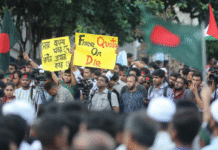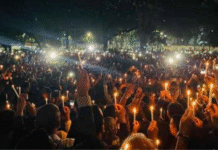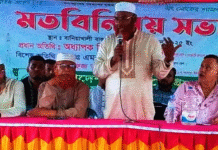BCL, JCD fear rise of ‘dark forces’ if student politics banned

The relationship between Awami League’s associate body, Bangladesh Chhatra League, and Bangladesh Nationalist Party’s student wing Jatiyatabadi Chhatra Dal is always antagonistic. At least, the incidents of violence between the two student wings say so.
But, the rival camps of the two major political parties have stood up in unison against the ban on student politics at Bangladesh University Engineering and Technology (BUET).
Leaders of both the parties think if the student politics is banned on the campus, ‘dark forces’ will be gaining grounds there.
However, no political parties except BCL and JCD have any visible presence at the university. It had been a one-party dominion since 2009.
The leaders of Bangladesh Chhatra League and Jatiyatabadi Chhatra Dal said they do not abide by the decision of ban on student politics on BUET campus. The BCL and JCD central leaders also declined to disband their BUET unit committees.
Leaders of both the camps claimed that if student politics is banned, the communal and fundamental organisations will exploit the chance and the progressive thinking will be threatened on the campus.
BCL central committee’s acting president Al Nahean Khan Joy said the crisis that has emerged on the BUET campus will not be resolved through banning student politics. “Demand to eliminate the harmful sides of student politics can be raised, but the decision to ban the student politics is illogical.”
“A written application will be sent to the BUET authorities soon to withdraw the ban. Once student politics is banned the activities of communal and fundamental forces will rise secretly. That won’t bring any good for the country,” said Nahean.
JCD central committee general secretary Iqbal Hossain said if normal politics is banned “the abnormal politics” will spread on the campus.
He voiced his apprehensions in unison with Chhatra League on the matter saying, “We don’t comply with the BUET authorities decision to ban student politics on the campus. We won’t disband the BUET unit committee either.”

Call to review BUET ordinance
Article 16 of the BUET ordinance prohibited organisational politics at the university.
The ordinance titled “The East Pakistan Engineering and Technological University Ordinance” was passed in 1961, during the regime of then Pakistani military ruler Ayub Khan.
According to the article, no club or society or student organisation can be formed without any written approval from Director of Student Welfare (DSW). Even, the students won’t be allowed to hold any meeting, party or entertainment programmes on the campus without an approval from the DSW.
“The law by which BUET is regulated was passed by Pakistani autocrat Ayub Khan. This law can’t be operated in the independent Bangladesh. This law must be amended,” JCD central committee general secretary Iqbal Hossain said.
BCL’s Nahean also demanded amendment of the article of the BUET ordinance. “The student politics in Bangladesh has a glorious past. The students took to the street and protested whenever any crisis broke out and remained vocal for student rights. That’s why ban on student politics is not logical.”
Some of the BCL leaders said they are preparing for filing a writ with the High Court in a bid to abolish the article and against the decision.
On Monday afternoon, a platform named ‘Muktijuddha Mancha’ formed a human chain at the foot of Anti-Terrorism Raju Memorial Sculpture on the Dhaka University campus.
The speakers at the human chain termed the BUET’s law a ‘Pakistani Ordinance’ and demanded for scraping it.
The platform also called on to the authorities concerned to chalk out new policy to regulate the Bangladesh University of Engineering and Technology.
“Ordinance relating to the Board of Residence and Discipline” was formed under the BUET ordinance. The board holds all rights to take action against any unauthorised student organisation on the campus.
In 2002, BUET’s student of chemical engineering department Sabekun Nahar Sony was killed during a gunfight between two factions of Chhatra Dal. Following the killing, the Academic Council of the university enforced the article on 20 July of that year for the first time.
The university authorities have now decided to revive the law following brutal murder of Abrar Fahad, a 21-year-old student of the university’s Electrical and Electronic Engineering department. Abrar was beaten to death by a number of BUUET unit BCL leaders and activists inside his dormitory, Sher-e-Bangla Hall, in the early hours of 7 October.









